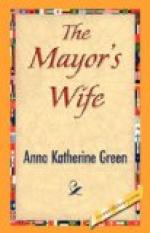“No, no; I’m all right.” But her eyes, hunted and wandering, belied her words.
I drew her hands down into mine across the table lying between us.
“I want to help you,” I whispered; “I think I can. Something has happened which gives me great hope; only do me a favor first; show me, as you promised, the papers which I dug out for you.”
A smile, more bitter than any tear, made her face look very hard for an instant, then she quietly led the way into the small room at the back. When we were quite alone, she faced me again and putting her hand to her breast took out the much creased, much crumpled bit of paper which was her only link to youth, to her life, and to her love.
“This is all that will interest you,” said she, her eyes brimming in spite of herself. “It is my marriage certificate. The one thing that proves me an honest woman and the equal of—” she paused, biting back her words and saying instead—“of any one I see. My husband was a gentleman.”
It was with trembling hands I unfolded the worn sheet. Somehow the tragedy of the lives my own had touched so nearly for the last few days had become an essential part of me.
“John Silverthorn Brainard,” I read, the name identical with the one I had just seen as the early signature of the man who claimed a husband’s rights over Mrs. Packard. The date with what anxiety I looked at it!—preceded by two years that of the time he united himself to Olympia Brewster. No proof of the utter falsity of his dishonorable claim could be more complete. As I folded up the paper and handed it back, Bess noted the change which had come to me. Panting with excitement she cried:
“You look happy, happy! You know something you have not told me. What? what? I’m suffocating, mad to know; speak—speak—”
“Your husband is a man not unknown to any of us. You have seen him constantly. He is—”
“Yes, yes; did he tell you himself? Has he done me so much justice? Oh, say that his heart has softened at last; that he is ready to recognize me; that I have not got to find those bonds—but you do not know about the bonds—nobody does. I shouldn’t have spoken; he would be angry if he knew. Angry? and I have suffered so much from his anger! He is not a gentle man.”
How differently she said this from the gentleman of a few minutes back!
“But he doesn’t know that I am here,” she burst out in another instant, as I hunted for some word to say. “He would kill me if he did; he once swore that he would kill me if I ever approached him or put in any claim to him till he was ready to own me for his wife and give me the place that is due me. Don’t tell me that I have betrayed myself, I’ve been so careful; kept myself so entirely out of his eyes, even last night when I saw the doctor go in and felt that it was for him, and pictured him to myself as dying without a word from me or a look to help me bear the pain. He was ill, wasn’t he?—but he got better. I saw him come out, very feeble and uncertain. Not like himself, not like the strong and too, too handsome man who has wrung my heart in his hand of steel,—wrung it and thrown it away.”




